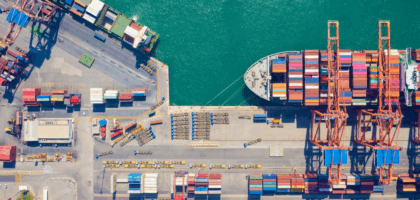Last year, we did a piece on the three most common supply chain myths. But, as with anything, there are myths about EVERYTHING. We’ll get into some of the most common you may have heard about the freight forwarding industry.
Myth #1: Freight forwarders are expensive (and not worth the cost).
There’s an old adage that time is money. Using a freight forwarder can not only save you money in the long run, but it can save you valuable time.
Yes, freight forwarders do earn revenue by finding the most suitable carriers for their customers, but in the time it would take you as the shipper to do the research, contact carriers for pricing, call customs regarding clearance (for international shipments), and organize the right transportation mode to deliver the freight from the port to your warehouse, you may be running around 3-4 days at least to get everything sorted out. With a customs broker and/or freight forwarder helping, all the above could be done in as little as 3-4 hours by a logistics professional.
While the extra costs of a freight forwarder may seem like a waste, they find the best option for your freight and ensure it is handled properly. As experts in their field, a freight forwarder can save you both time and money.
Myth #2: Freight forwarders are not selective about their carriers.
This is absolutely false. A freight forwarder has an obligation to choose the most reliable and safest carriers to handle your freight, as your freight is THEIR responsibility. Not only are they obliged to care, but they also have a financial incentive to ensure the shipment is delivered safely. Most freight forwarders are very choosy with their carriers and check them over time to verify they’re remaining in compliance with the forwarder’s criteria.
Myth #3: Freight forwarders provide little to no transparency.
Again, a BIG misconception that was most likely established from historical industry conditions where freight forwarders were unable to gain a standard level of information to maintain transparency with their customers (think about pre-internet times).
In actuality, freight forwarders in today’s world are able to quickly and readily access information with the click of a button, and then relay that information to their customer—all while leveraging long-standing global relationships to build overall transparency in their operations and services.
Myth #4: A customs broker isn’t necessary.
Technically, this is correct. You don’t necessarily NEED a customs broker to clear freight for you, but you might WANT to for two important reasons.
- A customs broker is going to have experience with a variety of commodities and the potential for other government agency reporting (FDA, Agriculture, EPA, FCC, etc.) and/or licensing that may be required.
- Importers processing their own clearances with customs are required to pay all duties immediately as part of the clearance process. Customs brokers are participants in Customs’ Automated Broker Interface (ABI) and are allowed to pay duties within 10 business days after entry and release of the shipment. A customs broker can pass this benefit on to their customers as part of their service.
Myth #5: Purchasing cargo insurance is a waste of money.
Buying cargo insurance (which is a fraction of the cost to move the freight) is a MUST when shipping, well…anything! Having the mindset of not needing it may work for the most part…until it doesn’t, and you find yourself facing damage to your cargo or a complete loss.
Situations happen all the time that are not in a freight forwarders’ control (including things like Acts of God, Acts of War, and Acts of Public Enemies). In such cases, cargo insurance may prevent huge losses. That is why many freight forwarders always recommend purchasing cargo insurance, so you’re protected.
Resources:
- 5 Common Misconceptions About Freight Forwarders (JFLL)
- 5 Misconceptions Shippers Have About Freight Brokers (Reuters Events)
- 10 Freight Shipping Myths and Misconceptions (Flock Freight)



